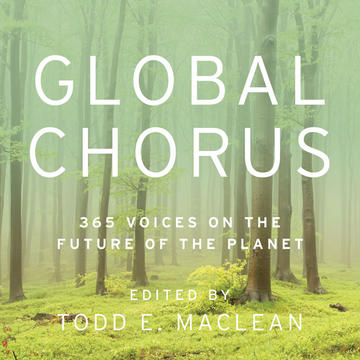Global Chorus is a remarkable, illustrated collection of 365 daily meditations around some very large and increasingly crucial themes:
“Do you think that humanity can find a way past the current global environmental and social crises? Will we be able to create the conditions necessary for our own survival as well as that of other species on the planet? What would these conditions look like? In summary, then, and in the plainest of terms, do we have hope, and can we do it?”
The contributors include writers, environmentalists, spiritual leaders, politicians, professors, doctors, athletes, business people, farmers, chefs, yogis, painters, architects, musicians, TV personalities, humanitarians, children, concerned students and senior citizens, carpenters, factory workers, activists, CEOs, scientists—essentially people who have something passionate and insightful to say about humanity’s place on Earth. Well-known people on the list include environmentalists such as David Suzuki, Paul Hawken and Jane Goodall; scientists such as Stephen Hawking and Edward O. Wilson; personalities such as Jamie Oliver, Maya Angelou, Les Stroud and Bruce Cockburn; humanitarians such as Nelson Mandela and Archbishop Desmond Tutu; political figures such as Mikhail Gorbachev, Justin Trudeau and Elizabeth May; writers like Temple Grandin, Farley Mowat and John Ralston Saul; and spiritual leaders like His Holiness The 14th Dalai Lama of Tibet and Lama Surya Das. The vast majority of the contributions contained within Global Chorus are completely original, with some coming from public speeches or previously published sources.
And all contributors to this fundraising book have generously and graciously donated their time and efforts, as proceeds from the sales of Global Chorus will be distributed to a select group of organizations helping to recover, protect and sustain life on Earth.
The extraordinary thing about this book is that it is a living demonstration of one of the key approaches to planetary sustainability: collaboration among many different walks of life, areas of expert knowledge, and levels of society. If we can come together like this as people who care and offer a diverse range of complementary solutions, I truly believe there is hope for life on earth.—Deborah Harford, executive director of ACT (the Adaptation to Climate Change Team) at Simon Fraser University



